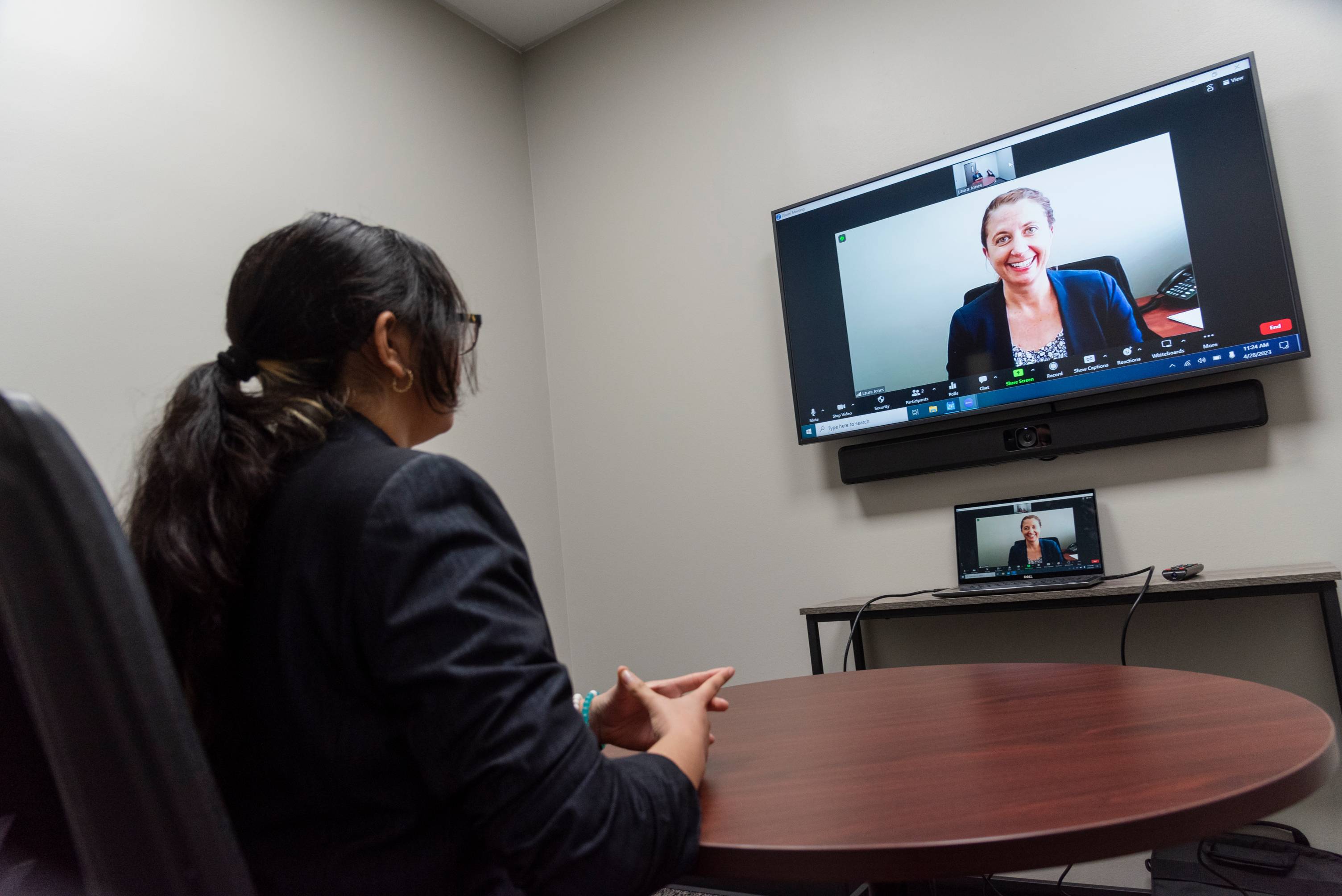Students may request a private interview room in the office of Career Services. Students may bring their own laptop/equipment, or they may borrow equipment from Career Services for virtual interview needs. Appointments are based on availability Monday-Friday, 8am-5pm.
Preparing for the Successful Job Interview
The job interview is a mutual exchange of information. Think of the interview not as an interrogation but as a two-way conversation during which you and the employer determine whether you meet each other's needs.
As the applicant, your main objectives are to:
- communicate information about your skills and qualifications clearly and accurately.
- connect this information to the requirements of the job for which you are interviewing.
- seek additional information about the position and employer to determine if the position is an appropriate fit.
The interviewer's main objectives are to:
- assess how closely your qualifications match the requirements of the position and organization.
- present the organization in a positive manner and supply accurate information about it to you.
There are a number of steps that you need to complete to maximize the success of this conversation.
Request an Interview Room

Want Some Practice?
Interview Success Guide
STEP ONE: PREPARE
Prepare all necessary documents needed for the interview- resume, cover letter, etc.
You will always want to bring along extra copies of your resume, transcript, and references. Consider purchasing a leather portfolio to hold your documents and a pen and paper to record notes. For assistance in editing your resume or cover letter, come by Texas State Career Services and meet with a career counselor/educator or upload your document for an online resume review.
Plan your attire.
First impressions are powerful - make sure to look your best. Suggestions for professional dress for an interview include:
- Suits/dresses: Conservative, in dark, neutral colors (navy, black, gray, or tan), skirt length just above knee, no mini skirts
- Shirts/blouses: Simple, in soft colors and not revealing, Stay away from loud or bright fabric patterns
- Socks: Calf-length, complementing the suit
- Stockings: Skin tone or neutral color to match suit
- Shoes: Polished, should match suit; low to medium heel
- Ties: Silk, coordinated with suit
- Handbag: Medium to small size
- Jewelry: Limited accessories; small earrings
Anticipate the interview’s format.
Ask questions beforehand such as: “With whom will I be meeting?” “How long should I plan to be at your office?” Knowing the format will help you prepare for the interview experience.
Step Two: Research the Organization and the Position
Learn as much as possible about the organization and position you are applying for before the interview. Visit the organization’s web
site. Look up the company’s mission statement and goals to see how you may fit with the company’s goals and culture. Analyze the job description and try to match your experiences, interests, and abilities to the requirements for the position. Use the resources on this website and investigate links related to your particular occupational field.
Step Three: Know Yourself
Prepare to discuss your strengths, weaknesses, education,
work experiences, personal goals, and values. Read the job description thoroughly, anticipating questions that focus on your qualifications, the organization, and how the two fit together.
Questions you may be asked include:
- Tell me about yourself.
- What are your goals?
- Why do you want to work for this organization?
- Why should we hire you?
Step Four: Ask Questions
The questions you ask will reveal much about your level of interest in the organization and your level of preparation for the interview. Make a list and ask questions that demonstrate a genuine interest in and knowledge of the organization and position.
Although each situation will warrant specific inquiries, some suggested questions include:
- What characteristics do you look for in a successful employee?
- What are a few of the issues I will be expected to solve?
- What is the traditional career path for this position, and in what ways do you evaluate employees?
- If I may ask, what is your timetable for filling this current position?
Step Five: Follow Up
Write a brief letter of thanks for the interview. In the letter you
need to reiterate your interest in the position and briefly state why you are the best candidate. If you do not hear from anyone in a week, then call to express your continued interest in the position.
Suggestions for a Better Interview
Be sure to:
- Arrive early
- Be neatly groomed
- Dress professional
- Make eye contact
- Give a firm handshake
- Demonstrate good posture
- Speak with confidence
- Maintain interviewer’s pace, style of speech
- Be polite
- Answer questions directly
- End interview with gratitude and enthusiasm about the job
Do not:
- Arrive late without warning
- Look shabby or disheveled
- Wear obnoxious attire
- Under- or over-dress
- Avoid eye contact
- Have a weak or overpowering handshake
- Slouch or show bad posture
- Speak too loudly or too softly
- Appear hyperactive or passive
- Make answers too lengthy or brief
- End interview without gratitude
Types of Interview Questions
The most common type of interviewing question is “behavioral”. Behavioral questions attempt to determine how you might operate on the job. How you responded to past situations is of great interest to the interviewer in assessing your potential as an employee.
Examples of behavioral questions include:
- Give me an example of a time when you had to juggle multiple tasks.
- Tell me about a situation in which you solved a problem as a member of a group. What was your role?
- Tell me about a problem you once had on the job. How did you go about resolving the problem?
Traditional Questions
Traditional questions include questions that clarify points on your resume, evaluate your accomplishments and goals, and assess your expectations of the organization. "Themes" also work into these questions, as well as many opportunities for you to showcase your strengths. Some traditional questions and themes include:
- Question: What are your strengths and weaknesses?
- Theme: How well you know yourself, as well as how honest and open you are
- Question: Where do you see yourself in five years?
- Theme: Ambition
- Question: Why should I hire you?
- Theme: Understanding of organization's needs, as well as confidence of your qualifications
Difficult Questions
Difficult questions are those that you are hoping they won’t ask. For instance, if your resume does not show continuous employment, you can expect to be asked to explain any gaps. In order to answer these questions, you will need to come to terms with the issue at hand, see the positive side of it, and demonstrate that you are eager to move on with your career.
